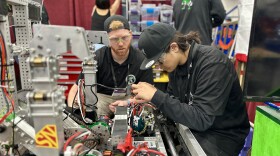The proposed soccer city development at the Qualcomm Stadium site will be a tax revenue generator for the city. That is according to a new analysis by the San Diego regional economic development Corporation. They are hoping that information like that will persuade the San Diego city Council to place the soccer city proposal on the ballot as part of a citywide special election in November. Joining us is Erik Anderson. What kind of revenue generator does the study say soccer city would be? What they say is once a project is built out and you have to understand the scope of the project. They're talking about a large River Park. They are talking about the soccer stadium which will generate tax money because it will generate activity and commercial activity. There will be retail activity on the site stores, restaurants that will generate sales tax. There will be homes that will generate property tax. A couple of hotels that could generate other taxes for the city of San Diego. The tech stream is pretty broad and we are seeing once the entire project is built out which could be 10 or 15 or 20 years down the road that it will generate a net revenue of about $21 million a year. What they also argue is that it could also allow the city to borrow against that revenue stream. The stream of revenue that comes off of our project will accommodate payments for bonds. Use it to go build new schools or new roads and this is what the project that will provide for the city. The way that they break that down what they look at is the County of Seneca will get $281 million ability to sell bonds in the city of Senegal about $267 million in the school district about $853 million and you're asking why is a school district getting revenue it is the property tax. They get a share of the property taxes that are collected. To the developers commission the study was They did. The acts that develop Dutch about my Corporation to do the study. Back in March they look at the economic impact where they predicted an economic boost for the region. How important is it to get this on the ballot in November? It is kind of critical so the thing that's pushing that timeline is the major league soccer bid. They want to expand by four teams. They're interested in landing what are these franchises. The developers think if San Diego loses their paid for major league soccer franchise the other things you're not interested in. Is going to be sometime near the end of the year and this will be on the ballot in November in time it is key and some say the all the cities that are interested in doing this that they need to have a commitment to have a soccer stadium up and running by 2020 before they will award any city franchise. That is what everything is depending on. Reporter: I've been speaking with Eric Anderson. Thank you. My pleasure.
The SoccerCity development proposed for the Qualcomm Stadium site in Mission Valley would generate millions of dollars in taxes to help the San Diego Unified School District and the city and county of San Diego, according to a study released Tuesday.
Investors hope to transform the 166-acre site. They propose tearing down Qualcomm Stadium and building a transit-friendly urban village. It would include 4,800 homes, commercial space, hotels, a river park and a soccer stadium.
“It’s a huge parking lot, costing $12 million a year,” said Nick Stone of La Jolla-based FS Investors, the group working to build SoccerCity.
The study conducted by the San Diego Regional Economic Development Corporation for the developers found that the project would create a $1.4 billion tax value and generate $21.6 million a year in net tax revenue.
RELATED: Mission Valley Planning Group Demurs On Soccer City
"We're going to take the Qualcomm Stadium site, which today is a money loser for the city, and turn it into a revenue generator for the region," Stone said. "It will provide the city, county and school district with a new revenue stream to enhance vital services to the public."
FS Investors wants the San Diego City Council to place the SoccerCity proposal on the ballot as part of a citywide special election in November. That could happen this summer if the City Council chooses that option.
The investors are working with Major League Soccer to bring an MLS team to San Diego.
RELATED: ‘Soccer City’ Economic Impact Could Be Huge
The league plans to select expansion cities later this fall. To be selected, cities must first have a soccer-sized stadium approved and on track to open for the 2020 season.
The stadium could also be the new home for the San Diego State University Aztec football team which currently plays home games in Qualcomm Stadium. The facility is also expected to host concerts.







